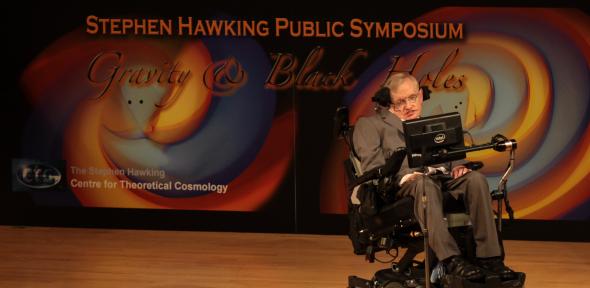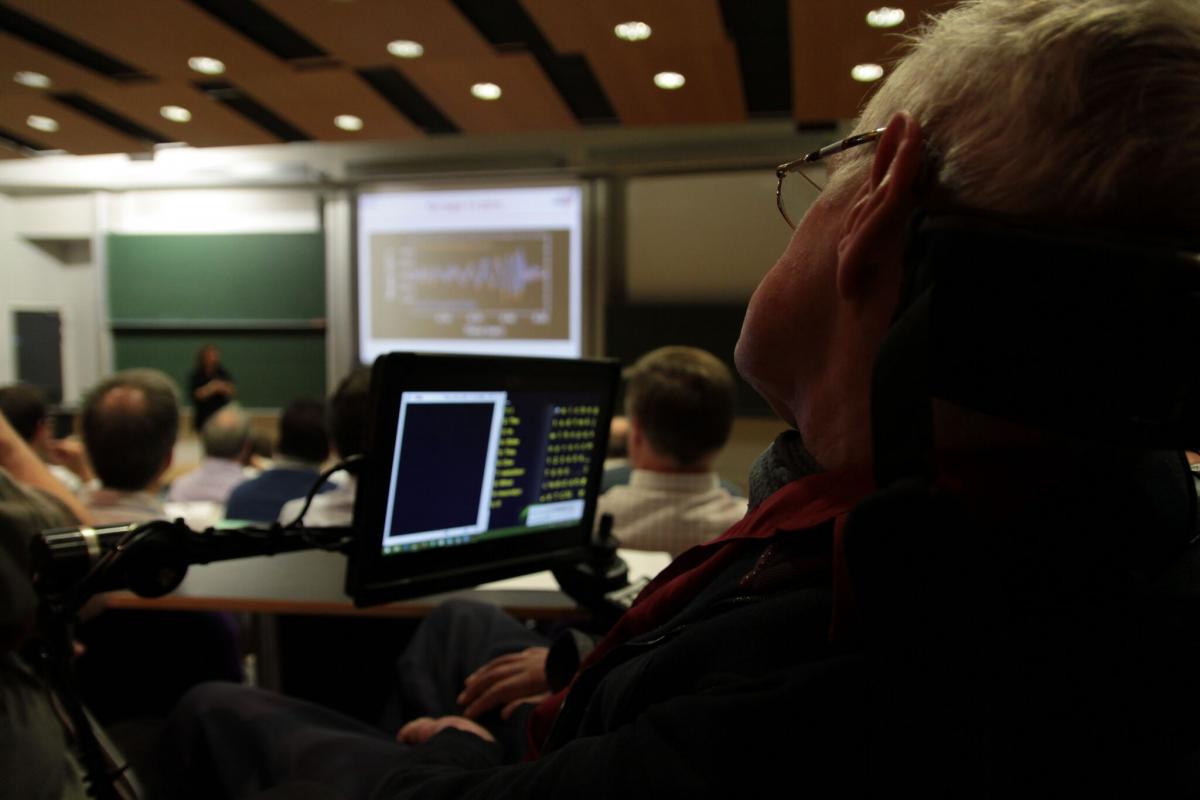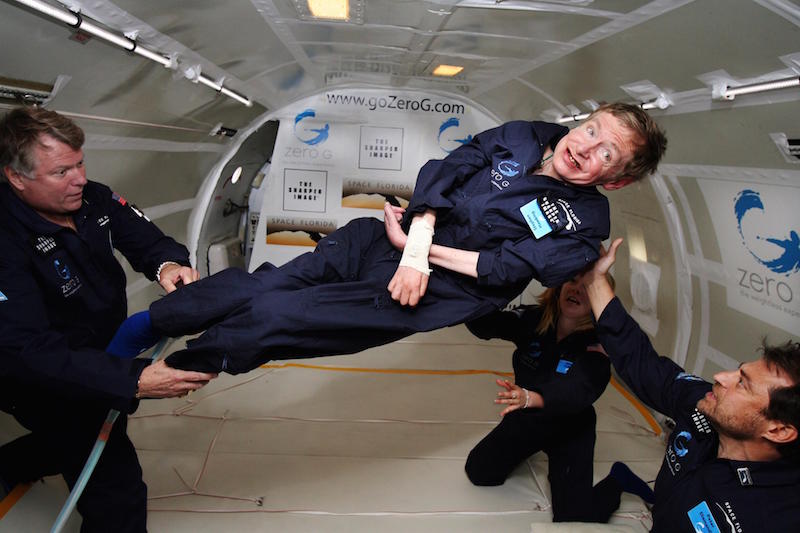
In July 2017 the Mathematics Faculty was proud to host the 75th birthday celebrations of Professor Stephen Hawking: Director of Research at the Department of Applied Mathematics and Theoretical Physics, the former Lucasian Professor of Mathematics, and the Founder of the Centre for Theoretical Cosmology.
Remember to look up at the stars and not down at your feet. Try to make sense of what you see and wonder about what makes the Universe exist.Stephen Hawking
Hawking has changed our view of the Universe, influencing both his academic colleagues, and the general public through his best-selling books, public lectures and broadcast appearances. In recognition of his impact on widening knowledge of cosmology, a public symposium in his honour was organised on Sunday 2 July and broadcast live online. Physicist and broadcaster Professor Brian Cox, Astronomer Royal Professor Martin Rees, former spokesperson of the LIGO collaboration Professor Gabriela Gonzales, and, most excitingly, Hawking himself, shared their scientific experiences and passion with viewers around the world. The celebrations carried on the following week with a scientific conference bringing together the best minds in gravitational physics and cosmology, an area embarking on a new golden age of observation.
Hawking joined the Department of Applied Mathematics and Theoretical Physics (DAMTP) in 1962 for his PhD with Denis Sciama. In 1979 he became Lucasian Professor of Mathematics, a chair previously held by scientists including Isaac Newton, Charles Babbage and Paul Dirac. At the beginning of his time at Cambridge few would have regarded cosmology, the study of the history and nature of the Universe as a whole, as a major scientific field. Half a century later, thanks in no small amount to Hawking's ground-breaking contributions, it has become not only a precision science, but one of the most exciting scientific fields today.
The conference is testament to these contributions. "What's truly remarkable is that all the different people [attending the conference] can trace the origin of their work back to Hawking's contributions, whether in black hole theory, cosmology or even quantum information," says David Tong, Professor of Theoretical Physics at DAMTP. "It's tribute to his many amazing achievements in science."
New windows on the Universe
Recently, one of Hawking's interests – the theory of black holes – has been boosted by the sort of experimental evidence that theoretical physicists can normally only dream of. At the beginning of Hawking's career, these gravitational monstrosities, predicted by Einstein's general theory of relativity, were considered by many to be mere anomalies in the theory. It was Hawking's work with Professor Roger Penrose of the University of Oxford which proved that such singularities are in fact ubiquituous in the theory. Hawking also showed that black holes are astonishingly simple objects, described only by their mass and angular momentum, and suggested that they aren't completely black, but emit radiation and can thus evaporate.
Hawking's predictions were based on pure theory, but in 2015 the LIGO experiment confirmed, for the very first time, the existence of gravitational waves (you can read more here). These ripples in the fabric of spacetime are caused by massive objects, such as black holes, distorting this fabric. In the case of the recent observations they were caused by two massive black holes, over 1 billion light years away from Earth, circling each other until finally merging into one.
In his public lecture Hawking described himself as lucky to have worked during a glorious time to do research in theoretical physics. Now he and other physicists are excited by a new era of gravitational wave astronomy, with detectors such as LIGO and its descendants opening new windows onto the Universe through gravitational waves. Gonzales expects many of Hawking's predictions will be observationally tested in the coming decades.
One example is Hawking's Area Theorem, that the total surface area of interacting black holes can never decrease, meaning that the area of a black hole created by the merger of two black holes will always be larger than the sum of the areas of the two initial black holes. "The Area Theorem which predicts the area of the final black hole produced from the merger of two black holes," says Gonzales. "With the sensitivity that we have so far [in LIGO] we can't derive independently the mass of the final black holes. But if we have much, much larger signals, which will come with much better detectors, we will be able to test that."

Hawking watching Gonzales' presentation on the LIGO results at the conference.
(This and lead image courtesy of Dr Tobias Baldauf)
Be curious
The impact of Hawking's work can be measured both by the scientific contributions he has made, and also in the effect he has had on generations of young physicists. "Hawking has inspired generations of scientists," says Dr Ulrich Sperhake, Lecturer at DAMTP. "When Brief History of Time came out many of us were at the beginning of our careers. I still can't believe that my office is just a few doors down from the great man."
In this spirit the scientific conference was an opportunity to share the latest results in Hawking's area of research. As well as Gonzales talking about the recent success at LIGO and the golden era of gravitational wave astronomy this opens up, others discussed the fundamental physics that will emerge from studying the Cosmic Microwave Background radiation, supergravity, and the combination of quantum physics and cosmology, together with phenomena such black holes evaporation by Hawking radiation.
The conference was a celebration of Stephen Hawking's achievements, but also of his attitude to the very human quest for understanding. "The fact that we humans, who ourselves are mere collections of fundamental particles of nature, have been able to come this close to an understanding of the laws governing us and our Universe is a great triumph. " he said in his public lecture. "I want to share my excitement and enthusiasm about this quest. So remember to look up at the stars and not down at your feet. Try to make sense of what you see and wonder about what makes the Universe exist. Be curious. And however difficult life may seem there is always something you can do and succeed at. It matters that you don't just give up."
You can watch Professor Hawking's public lecture online here.

Hawking taking a zero-gravity flight
(Image courtesy of NASA)
